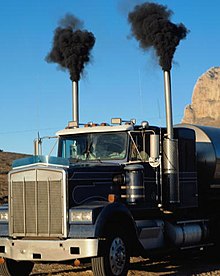
Back Roet Afrikaans Follín AN سناج Arabic ܫܘܡܪܐ ARC Qhisti Aymara Sūdis BAT-SMG Сажа Byelorussian Сажди Bulgarian Sutge Catalan Fumaticu Corsican

| Part of a series on |
| Pollution |
|---|
 |
Soot (/sʊt/ suut) is a mass of impure carbon particles resulting from the incomplete combustion of hydrocarbons.[1] Soot is considered a hazardous substance with carcinogenic properties.[2] Most broadly, the term includes all the particulate matter produced by this process, including black carbon and residual pyrolysed fuel particles such as coal, cenospheres, charred wood, and petroleum coke classified as cokes or char. It can include polycyclic aromatic hydrocarbons and heavy metals like mercury.[3]
Soot causes various types of cancer and lung disease.[4]
- ^ Omidvarborna; et al. (2015). "Recent studies on soot modeling for diesel combustion". Renewable and Sustainable Energy Reviews. 48: 635–647. Bibcode:2015RSERv..48..635O. doi:10.1016/j.rser.2015.04.019.
- ^ Kliment, Josef (2008). Carbon Black. Zlín: Czech Association of Industrial Chemistry. ISBN 978-80-02-02004-2.
- ^ "Black Carbon: A Deadly Air Pollutant". NoMorePlanet.com. 2020-09-13. Archived from the original on 2021-03-04. Retrieved 2020-11-01.
- ^
- Bond, T. C.; Doherty, S. J.; Fahey, D. W.; Forster, P. M.; Berntsen, T.; Deangelo, B. J.; Flanner, M. G.; Ghan, S.; Kärcher, B.; Koch, D.; Kinne, S.; Kondo, Y.; Quinn, P. K.; Sarofim, M. C.; Schultz, M. G.; Schulz, M.; Venkataraman, C.; Zhang, H.; Zhang, S.; Bellouin, N.; Guttikunda, S. K.; Hopke, P. K.; Jacobson, M. Z.; Kaiser, J. W.; Klimont, Z.; Lohmann, U.; Schwarz, J. P.; Shindell, D.; Storelvmo, T.; Warren, S. G. (2013). "Bounding the role of black carbon in the climate system: A scientific assessment" (PDF). Journal of Geophysical Research: Atmospheres. 118 (11): 5380. Bibcode:2013JGRD..118.5380B. doi:10.1002/jgrd.50171.
- Juliet Eilperin (2013-11-26). "Black carbon ranks as second-biggest human cause of global warming". The Washington Post. Retrieved 2013-12-04.